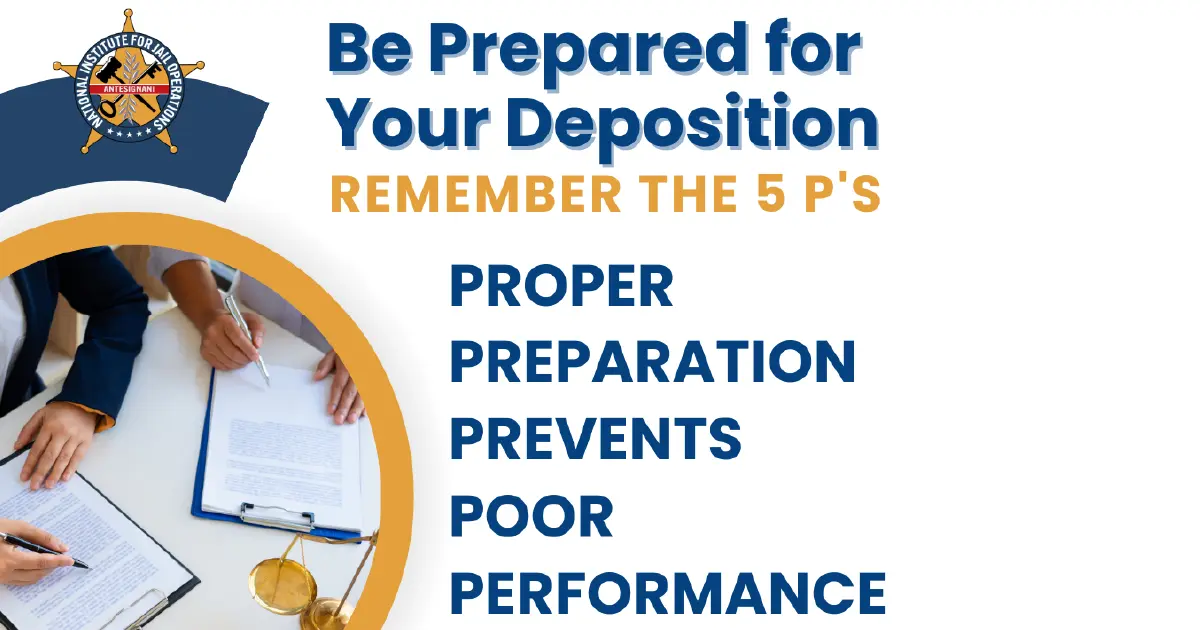Is your agency getting sued? Have you been called as a witness to appear at a deposition? While a deposition may lack the formality of a courtroom, its significance in the discovery process cannot be overstated. A deposition provides an opportunity for attorneys to gather crucial facts and information that will shape their claims and defenses during the trial. As a witness, your sworn testimony can greatly impact the outcome of the case.|
When you’ve been called to a deposition, remember the 5 Ps:
PROPER
PREPARATION
PREVENTS
POOR
PERFORMANCE
Every word you say during a deposition holds weight and can be brought before the jury. It is vital to approach this with utmost preparedness and seriousness. Poor performance can be avoided by thorough preparation.
In addition to the 5 “P”s for success, there are a few other important tips that you should keep in mind as you prepare and attend a deposition.
Other Important Tips to Remember:
- Meet and confer with the attorney prior to the deposition.
- Always tell the truth.
- Answer the question after allowing a couple of seconds to elapse.
- Answer the question asked and only the question asked.
- This is not your time to tell the story and explain everything unless directed to do so by your attorney.
- Be sure you understand the question.
- Do not answer a question if you don’t understand it.
- Be sure the question is fully completed before beginning the answer.
- Talk in full and complete sentences.
- Once finished with a complete answer, remain quiet.
- Answer only what you presently remember.
- Make the plaintiffs’ attorney let you finish your answer.
- Do not guess!!
- Stay out of arguments between the attorneys.
- Be cautious if the attorney asks you to estimate something.
- Remain calm and polite at all times, regardless of any provocation by the attorney.
- Watch for trick questions like, “Would it be fair to say…” or “Isn’t it true that…”
- Do not make excuses for a lack of memory “complaining how long ago something happened.”
- Do not volunteer your thought process on how you came to an answer.
- If testifying about a conversation make it clear if you are paraphrasing or quoting.
- When giving testimony about complicated events or extensive conversations summarize when possible.
- Be cautious of compound questions and do not answer unless you are certain that you have all parts of it in your mind.
- Never characterize your testimony with phrases such as “in all candor,” “Honestly,” or “I am doing the best I can.”
- Avoid absolutes. “I never” or “I always” they have a way of coming back to cause you issues.
- Do not give testimony about what other people know or did unless specifically asked to do so. Do NOT guess.
- Do not volunteer your state of mind unless directed t do so by your attorney.
- Avoid levity or sarcasm.
- Do not use any obscenities or racial/ethnic slurs or references. There is no such thing as “off the record.” Assume everything is on the record and act accordingly.
- If the attorney appears confused. Do not help him/her.
- Do not be drawn in by the attorney’s smile, nods of the head or shrugs of the shoulders.
- If you are caught with an implied or actual inconsistency, do not panic.
- Every witness makes mistakes.
- If information is contained in a document that has been marked as an exhibit, ask to see the document.
- Do not let the attorney put words in your mouth.
- Listen to the comments or objections made by your attorney.
- If your testimony is interrupted by your attorney, STOP TALKING!!
- Any conversations you had with your attorney is protected by attorney-client privilege.
- You will be asked what documents you reviewed and who you talked to in preparation for the deposition. Tell them. Do not deny you met with your attorney.
- Dress professionally.
- Be yourself.
Always opt to review and sign your deposition transcripts. This is your time to correct any transcription mistakes regarding your testimony. Remember that being proper preparation prevents poor performance!
Retired Captain Sean T. Stewart
Stewart Criminal Justice Consulting



